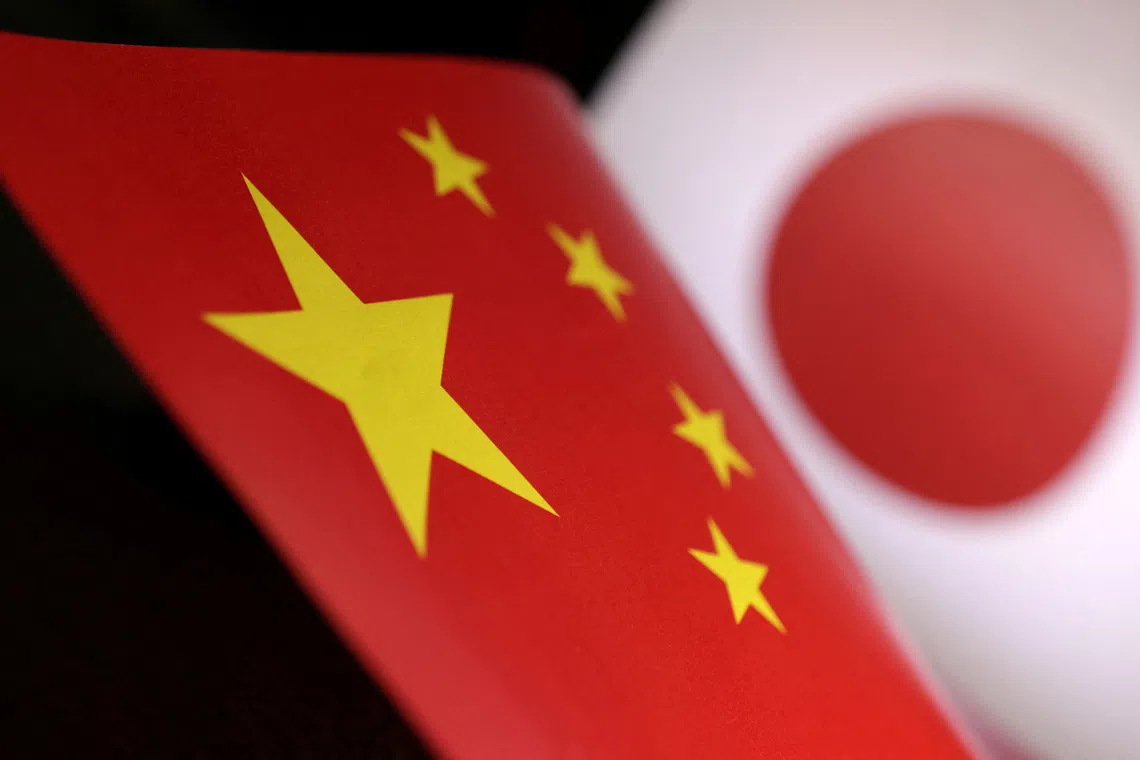China says trade cooperation with Japan ‘severely damaged’ by Taiwan comments
Sign up now: Get insights on Asia's fast-moving developments

Experts say there is no easy way to mend the ties between Japan and China.
PHOTO: REUTERS
BEIJING – Trade cooperation between China and Japan has been “severely damaged”, the Chinese Commerce Ministry said on Nov 20, urging the Japanese Prime Minister to retract her comments on Taiwan or face the consequences.
A diplomatic spat between China and Japan has intensified since Ms Sanae Takaichi told Parliament on Nov 7 that a hypothetical Chinese attack
“Prime Minister Takaichi’s openly erroneous remarks concerning Taiwan have fundamentally undermined the political foundation of China-Japan relations and severely damaged bilateral economic and trade exchanges,” Ms He Yongqian, a ministry spokeswoman, told a regular news conference.
“Should the Japanese side persist on its course of action and continue down the wrong path, China will resolutely take the measures required, and all consequences shall be borne by Japan.”
A spokesperson for Ms Takaichi said her comments on Taiwan did not change existing Japanese policy.
US says it will stand by Japan
China is Japan’s second-largest export market after the United States, buying about US$125 billion (S$163 billion) of Japanese goods in 2024, mainly industrial equipment, semiconductors and automobiles, according to UN COMTRADE data.
Tokyo could struggle to find alternative markets if China closes its doors to Japanese goods. South Korea, its third-largest export destination, absorbed only US$46 billion worth in 2024, the data shows.
Ms He said she had “no information to provide at present” when asked to confirm reports that China had indicated it would ban all imports of Japanese seafood.
The world’s second-largest economy has a record of taking coercive trade actions against its neighbour.
In 2023, Beijing imposed a blanket ban on imports of all Japanese seafood
In 2010, China halted rare earth exports to Japan for about seven weeks after the Japanese authorities detained a Chinese fishing captain whose vessel had collided with coast guard ships near the Senkaku Islands, which Beijing claims as the Diaoyu Islands.
“Coercion is a hard habit to break for Beijing. But just as the United States stood by Japan during China’s last unwarranted ban on Japanese seafood, we will be there for our ally again this time,” US Ambassador to Japan George Glass said in an X post on Nov 20.
The US State Department’s deputy spokesperson Tommy Pigott posted on X that US support for Japan was “unwavering”.
“We firmly oppose any unilateral attempts to change the status quo, including through force or coercion, in the Taiwan Strait, East China Sea, or South China Sea,” Mr Pigott said, without mentioning China.
Before the 2023 ban, China was Japan’s top scallop buyer and a major importer of sea cucumbers.
Relations had looked to be improving, with Chinese leader Xi Jinping and Ms Takaichi agreeing
Now, Japanese seafood companies fear a return to past restrictions.
‘No immediate off-ramp’
“What’s frustrating is that things that were moving forward suddenly went backwards. And given the nature of the issue, this might well happen again,” said Mr Kazuya Yamazaki, the president of Sanwa Fisheries, a company on Japan’s northern Hokkaido island that used to export around 200 tonnes of scallops to China annually before imports ended.
His firm is among almost 700 that applied for export permits after China agreed to restart shipments of Japanese marine products.
There is no easy fix, Japanese officials and analysts say.
“There is no immediate off-ramp unless Takaichi retracts her comments, which she will not do as it will be political suicide. China has elevated the situation to a level where they can not easily back down,” said Mr Joseph Kraft, a financial and political analyst at Rorschach Advisory in Tokyo.
“The only solution is to play the long game and wait it out till China begins feeling the pain as well.”
Asked at a regular Chinese foreign ministry news briefing on Nov 20 whether China’s Premier Li Qiang would meet Ms Takaichi on the sidelines of this weekend’s G-20 summit in South Africa, its spokesperson said there were no plans to do so. REUTERS


